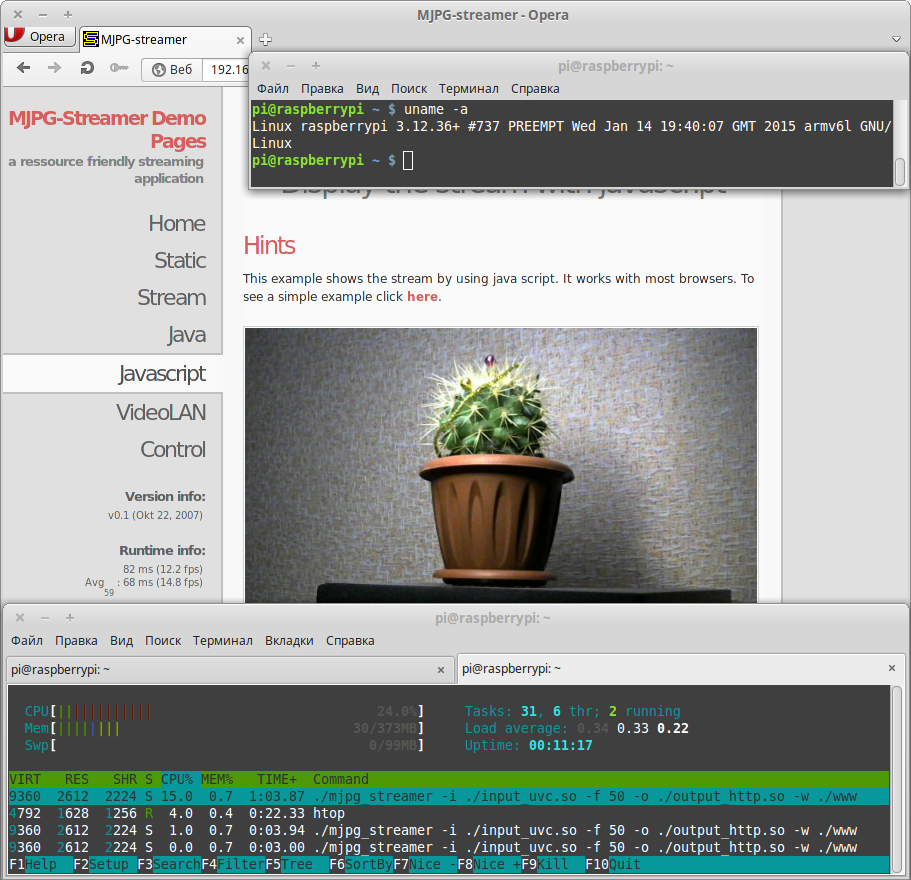January Raspberry Pi Update Breaking Streamer
The January firmware update from Raspberry Pi for Raspbian brought a surprise as a non-working stream from a camera processed using MJPG-Streamer. It would seem that everything happens as usual: the MJPG-Streamer starts up regularly, the web server works and is available, but there is no picture. There are no errors or warnings in the logs. The note presents the found solution to a similar situation.
The situation, of course, is not pleasant. In order to somehow start the broadcast, we had to add the -y parameter to the startup command, which switches the broadcast mode from MJPEG to YUYV, and even earned, but 5 times worse. Only 3 fps:

At the same time, as already mentioned, the video frequency is only 3 fps, and the processor load is 100%. Also shown is the latest version of the kernel, updated to which the broadcast broke. Currently it is 3.18.5 and it contains a bug. There are discussions and proposed solutions on the githaba in the firmware development branch, but none of them led to a positive result.
')
Obviously, something needs to be done about it. Although it is not correct to rearrange the system, no solution was found. Surprisingly, on the manufacturer’s website, previous versions of the system were not available for download. As it turned out, for good reason. Looking for more, there was a way to roll back the kernel using the Raspberry Pi itself. It is done by the same team that broke it:
The rpi-update utility updates the firmware. In this case, the argument is the hash of the desired commit to which you want to upgrade. This hash refers to the last commit on the kernel 3.12.36. The system has been updated to an outdated kernel. No matter how it sounds.
All commit hashes can be found here .
After successfully completing the command and rebooting, you can see the normal picture:

Be careful in choosing updates and do not do it without special need.
The situation, of course, is not pleasant. In order to somehow start the broadcast, we had to add the -y parameter to the startup command, which switches the broadcast mode from MJPEG to YUYV, and even earned, but 5 times worse. Only 3 fps:

At the same time, as already mentioned, the video frequency is only 3 fps, and the processor load is 100%. Also shown is the latest version of the kernel, updated to which the broadcast broke. Currently it is 3.18.5 and it contains a bug. There are discussions and proposed solutions on the githaba in the firmware development branch, but none of them led to a positive result.
')
Obviously, something needs to be done about it. Although it is not correct to rearrange the system, no solution was found. Surprisingly, on the manufacturer’s website, previous versions of the system were not available for download. As it turned out, for good reason. Looking for more, there was a way to roll back the kernel using the Raspberry Pi itself. It is done by the same team that broke it:
sudo rpi-update f74b92120e0d469fc5c2dc85b2b5718d877e1cbb
The rpi-update utility updates the firmware. In this case, the argument is the hash of the desired commit to which you want to upgrade. This hash refers to the last commit on the kernel 3.12.36. The system has been updated to an outdated kernel. No matter how it sounds.
All commit hashes can be found here .
After successfully completing the command and rebooting, you can see the normal picture:

Be careful in choosing updates and do not do it without special need.
Source: https://habr.com/ru/post/249909/
All Articles